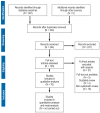Naturopathic Treatment and Complementary Medicine in Surgical Practice
- PMID: 30678751
- PMCID: PMC6369237
- DOI: 10.3238/arztebl.2018.0815
Naturopathic Treatment and Complementary Medicine in Surgical Practice
Abstract
Background: Many patients in Germany use naturopathic treatments and complementary medicine. Surveys have shown that many also use them as a concomitant treatment to surgery.
Methods: Multiple databases were systematically searched for systematic reviews, controlled trials, and experimental studies concerning the use of naturopathic treatments and complementary medicine in the management of typical post-operative problems (PROSPERO CRD42018095330).
Results: Of the 387 publications identified by the search, 76 fulfilled the inclusion criteria. In patients with abnormal gastrointestinal activity, acupuncture can improve motility, ease the passing of flatus, and lead to earlier defecation. Acupuncture and acupressure can reduce postoperative nausea and vomiting, as well as pain. More-over,aromatherapy and music therapy seem to reduce pain, stress and anxiety and to improve sleep. Further studies are needed to determine whether phytotherapeutic treatments are effective for the improvement of gastrointestinal function or the reduction of stress. It also remains unclear whether surgical patients can benefit from the methods of mind body medicine.
Conclusion: Certain naturopathic treatments and complementary medical methods may be useful in postoperative care and deserve more intensive study. In the publications consulted for this review, no serious side effects were reported.
Comment in
-
Consider Alternative Medicine.Dtsch Arztebl Int. 2019 Mar 29;116(13):222. doi: 10.3238/arztebl.2019.0222a. Dtsch Arztebl Int. 2019. PMID: 31064647 Free PMC article. No abstract available.
-
Hahnemann Forgotten.Dtsch Arztebl Int. 2019 Mar 29;116(13):222-223. doi: 10.3238/arztebl.2019.0222b. Dtsch Arztebl Int. 2019. PMID: 31064648 Free PMC article. No abstract available.
References
-
- Wortmann JK, Bremer A, Eich H, et al. Use of complementary and alternative medicine by patients with cancer: a cross-sectional study at different points of cancer care. Med Oncol. 2016;33 - PubMed
-
- Soós SÁ, Jeszenoi N, Darvas K, Harsányi L. Nem konvencionális gyógymódok használata sebészeti betegek között. Orv Hetil. 2016;157:1483–1488. - PubMed
-
- Pertz H, Lehmann J, Roth-Ehrang R, Elz S. Effects of ginger constituents on the gastrointestinal tract: role of cholinergic M 3 and serotonergic 5-HT 3 and 5-HT 4 receptors. Planta Med. 2011;77:973–978. - PubMed
-
- Sipos P, Gyõry H, Hagymási K, Ondrejka P, Blázovics A. Special wound healing methods used in ancient Egypt and the mythological background. World J Surg. 2004;28:211–216. - PubMed
Publication types
MeSH terms
LinkOut - more resources
Full Text Sources
Medical


